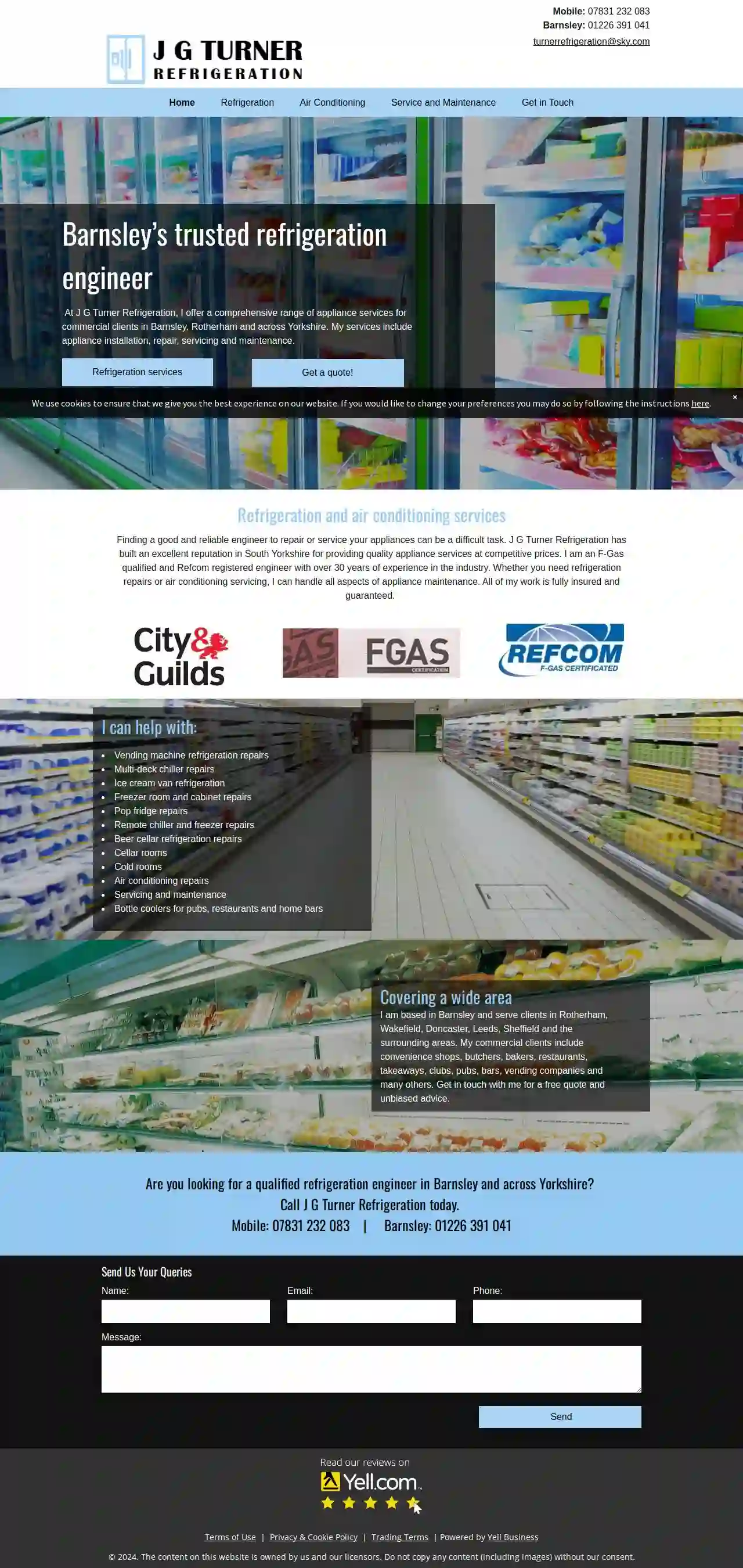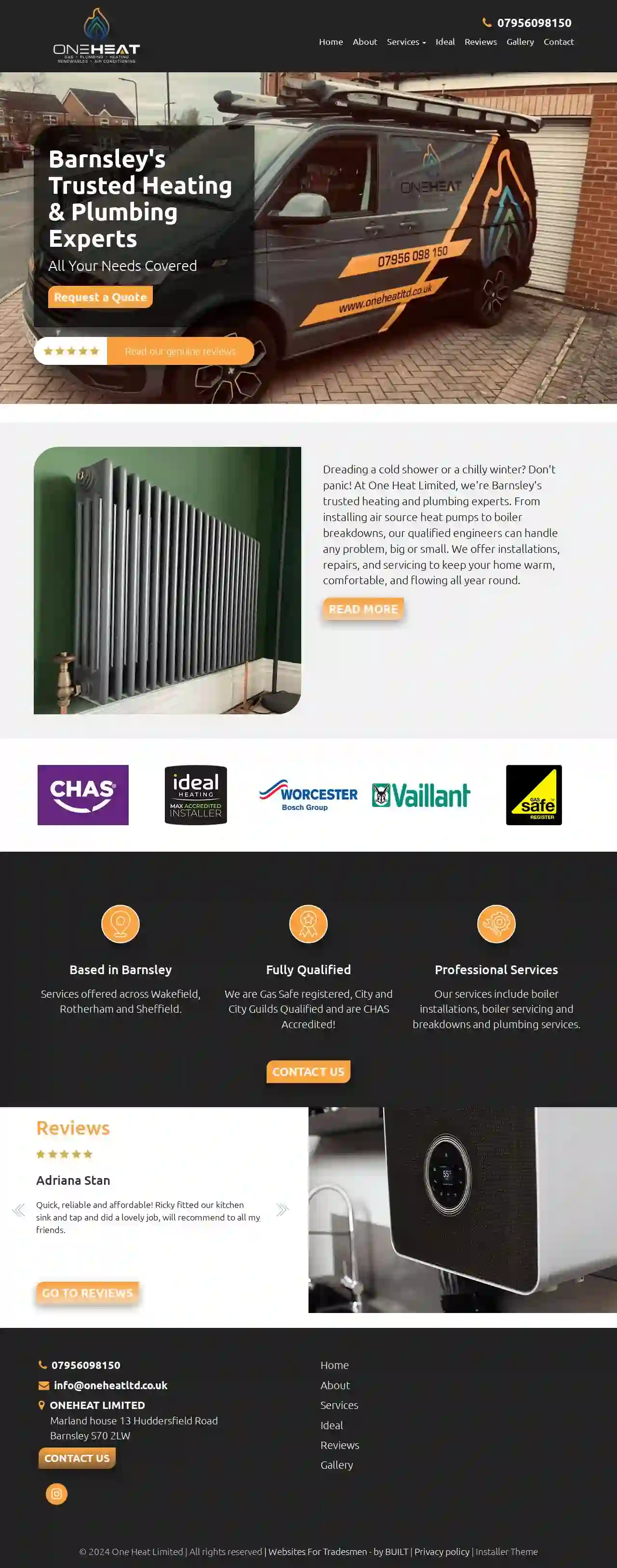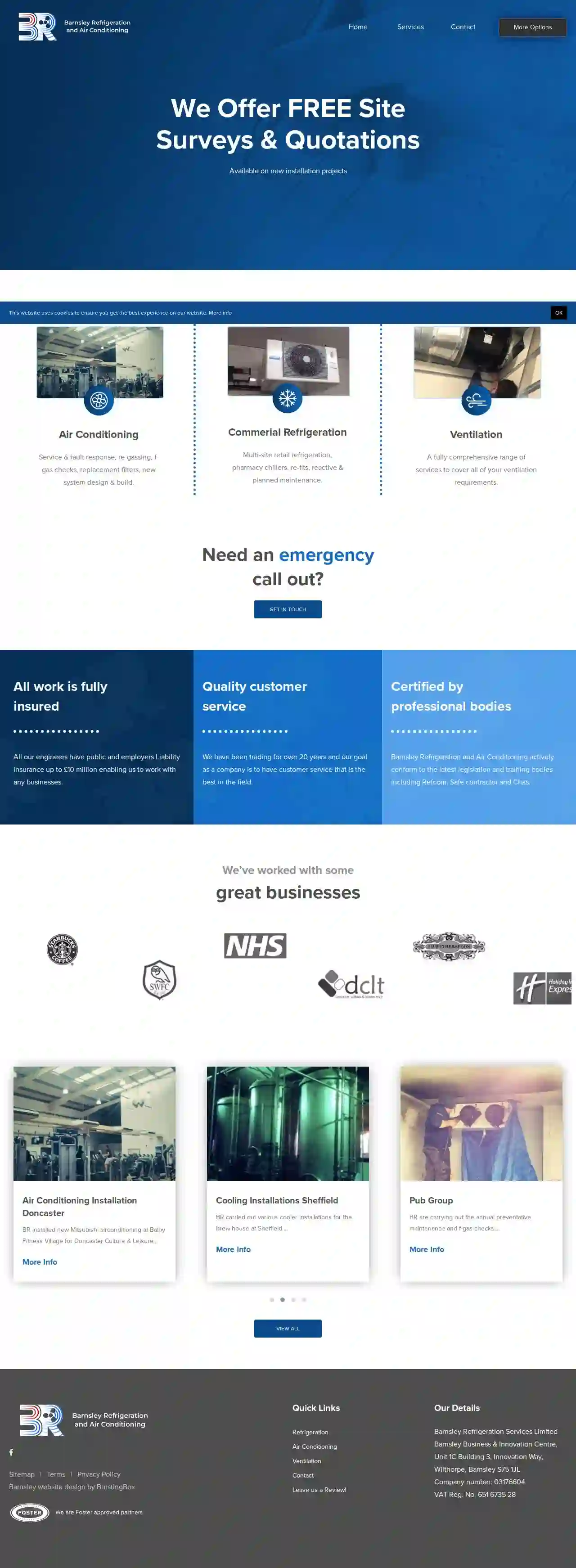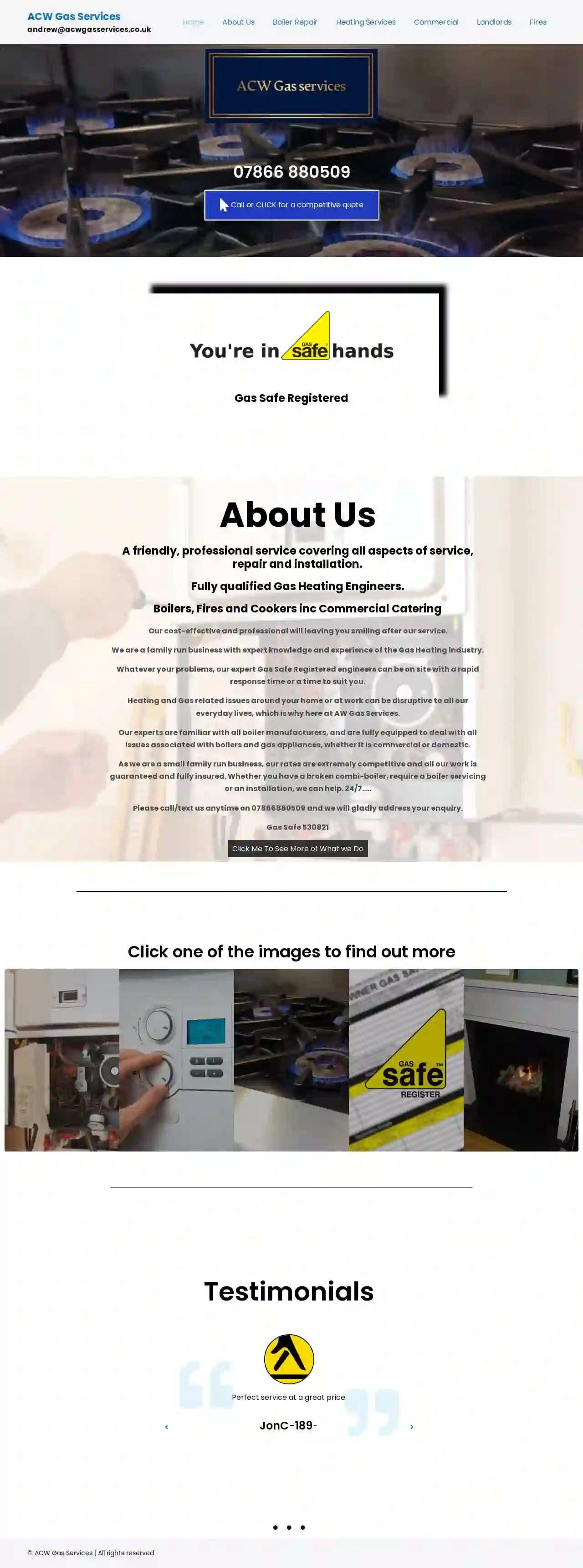HVAC Companies Penistone
Top AC and Heating Services in Penistone
Receive up to 3 HVAC Companies quotes for your project today! Compare profiles, reviews, accreditations, portfolio, etc... and choose the best deal.

J G Turner Refrigeration
57 reviewsBarnsley, GBAt J G Turner Refrigeration, I offer a comprehensive range of appliance services for commercial clients in Barnsley, Rotherham and across Yorkshire. My services include appliance installation, repair, servicing and maintenance. Finding a good and reliable engineer to repair or service your appliances can be a difficult task. J G Turner Refrigeration has built an excellent reputation in South Yorkshire for providing quality appliance services at competitive prices. I am an F-Gas qualified and Refcom registered engineer with over 30 years of experience in the industry. Whether you need refrigeration repairs or air conditioning servicing, I can handle all aspects of appliance maintenance. All of my work is fully insured and guaranteed.
- Services
- Why Us?
- Gallery
Get Quote
Bumford Heating Limited
471 reviewsUnit 2D Shortwood Business Park, Shortwood Court, Hoyland, Barnsley, South Yorkshire, S74 9LH, GBBumfords is a leading provider of boiler and heating services in Yorkshire and North Derbyshire. With over 30 years of experience, we offer a wide range of services including boiler installations, powerflushing, and servicing and repairs. Our team of expert engineers are fully trained and qualified to work on all types of boilers and heating systems. We pride ourselves on our excellent customer service and commitment to providing a high-quality service. Whether you're looking for a new boiler installation or just need a routine service, we're here to help. Contact us today to book your appointment and experience the Bumfords difference.
- Services
- Why Us?
- Accreditations
- Our Team
- Gallery
Get Quote
Future Gas Solutions Ltd
516 reviewsBarnsley, GBFuture gas is a reliable and professional gas, heating and plumbing services provider. We offer a wide range of domestic and commercial services, including installation, breakdowns, servicing, landlords gas safety inspections, Legionnaires safety checks, heating controls, catering, commercial, domestic, LPG, and oil. Our team strives to exceed expectations by ensuring that each client receives the very best service. We serve both domestic and commercial clients in various locations, combining the use of high-quality parts and equipment with dedication to delivering exceptional work. We provide individualised options and a free consultation to explain all available options, so you can choose the scope of work that's right for your home or business.
- Services
- Why Us?
Get Quote
z2 Plumbing & Heating
51 reviewsPontefract, West Yorkshire, Unit 6 South Baileygate, WF8 2LN, GBZ2 Engineering is a trusted and experienced provider of boiler installations, repairs, and maintenance services. With a team of highly skilled engineers, we offer a 24/7 emergency call-out service to ensure that our customers are back up and running as soon as possible. Our services include boiler installations, gas appliance inspections, central heating installation and maintenance, water hygiene, and landlord checks and certification. We are proud to be a Worcester Bosch accredited installer and offer a range of payment plans to suit our customers' needs. Our promise is to deliver a first-class service to our customers every time, and we're confident that once you've used Z2 Engineering, you'll recommend us to others who may need our services.
- Services
- Why Us?
- Gallery
Get Quote
Dynamic Mechanical Services Ltd.
510 reviewsDMC, County Way, Barnsley, S70 2JW, GBDynamic Mechanical Services Ltd is a key strategic provider of Plumbing, Heating, Ventilation, Air-Conditioning, Refrigeration, Process systems installation and maintenance services for industrial and commercial manufacturing companies in the North of England. With years of experience in the industry, we pride ourselves on delivering high-quality services that meet the needs of our clients. We love to add value at every step of the way, helping site engineering teams and facility managers as we blend in smoothly to work alongside our customers resource pools. Our team of skilled professionals is dedicated to ensuring that your equipment is running smoothly and efficiently, so you can focus on your business. Traceability and comitment to quality is deeply rooted in our core service offerings to customers. We provide all types of maintenance and installation along with key business support services such as; Asset Management, condition reporting, Compliance Support. Contact us today to learn about how we can help.
- Services
- Why Us?
- Gallery
Get Quote
GGB Heating Solutions- Boiler Installation Barnsley
51 reviewsGoldthorpe, Rotherham, 100 Probert Avenue, GBGGB Heating Solutions is a local heating specialist based in Rotherham, Barnsley, Doncaster, and Sheffield. Our team of Gas Safe registered engineers has been providing boiler and central heating services since 2003. We offer a wide range of services, including boiler installation, boiler servicing, boiler repair, power flushing, and more. Our goal is to provide a reliable and efficient service to our customers, ensuring their safety and comfort. With a reputation built on quality workmanship and fair prices, we are the go-to heating experts for homeowners in the local area.
- Services
- Why Us?
- Gallery
Get Quote
AirCentric - Commercial Air Conditioning
4.84 reviewsHoyland, 1-6 Barnsley Road, S74 0QN, GBTogether we create the perfect environment A National business specialising in Air Quality, Heating, Cooling and Ventilation, we work alongside you to create and realise your perfect environment. With over 20 years’ experience in the HVAC space, we are uniquely positioned to design, install and maintain creative HVAC solutions to complex, challenging and atypical situations. We provide products you want, services you need with support and guidance every step of the way.
- Services
- Why Us?
- Testimonials
- Gallery
Get Quote
OneHeat Ltd
4.946 reviewsMarland house 13 Huddersfield Road, Barnsley, S70 2LW, GBAt One Heat Limited, we're Barnsley's trusted heating and plumbing experts. From installing air source heat pumps to boiler breakdowns, our qualified engineers can handle any problem, big or small. We offer installations, repairs, and servicing to keep your home warm, comfortable, and flowing all year round.
- Services
- Why Us?
- Accreditations
- Our Team
- Testimonials
- Gallery
Get Quote
BR Cooling Maintenance
Barnsley Business & Innovation Centre, Unit 1C Building 3, Innovation Way, Wilthorpe, Barnsley, S75 1JL, GBBarnsley Refrigeration and Air Conditioning are a leading provider of refrigeration, air conditioning and ventilation services across Barnsley, Sheffield and Leeds. We offer a comprehensive range of services, from reactive maintenance to new installations, covering a variety of sectors including foodservice, retail and construction. With over 20 years of experience, we pride ourselves on delivering exceptional customer service and quality workmanship. Our team of qualified engineers are fully insured and certified by professional bodies such as Refcom, Safe Contractor and Chas, ensuring we meet the highest industry standards. We understand the importance of reliable and efficient climate control systems, which is why we offer 24/7 call-out services 365 days a year. Whether you need a routine service, emergency repair or a brand new system, we're here to help. Contact us today for a FREE site survey and quotation.
- Services
- Why Us?
- Accreditations
- Testimonials
- Gallery
Get Quote
acwgasservices
51 reviewsBarnsley, GBACW Gas Services is a friendly, professional service covering all aspects of service, repair and installation. Fully qualified Gas Heating Engineers. Boilers, Fires and Cookers inc Commercial Catering. Our cost-effective and professional will leaving you smiling after our service. We are a family run business with expert knowledge and experience of the Gas Heating industry. Whatever your problems, our expert Gas Safe Registered engineers can be on site with a rapid response time or a time to suit you. Heating and Gas related issues around your home or at work can be disruptive to all our everyday lives, which is why here at AW Gas Services. Our experts are familiar with all boiler manufacturers, and are fully equipped to deal with all issues associated with boilers and gas appliances, whether it is commercial or domestic. As we are a small family run business, our rates are extremely competitive and all our work is guaranteed and fully insured. Whether you have a broken combi-boiler, require a boiler servicing or an installation, we can help. 24/7... Please call/text us anytime on 07866880509 and we will gladly address your enquiry.
- Services
- Why Us?
- Accreditations
- Our Team
- Testimonials
- Gallery
Get Quote
Over 12,692+ HVAC Businesses on our directory
Our HVAC experts operate in Penistone and surroundings!
HVACCompaniesHub has curated and vetted the Best HVAC Contractors arround Penistone. Find the most reliable business today.
Frequently Asked Questions About HVAC Companies
- Regular Maintenance: Schedule annual HVAC maintenance to ensure your system is running at peak efficiency.
- Programmable Thermostat: Use a programmable or smart thermostat to optimize temperature settings based on your schedule.
- Seal Air Leaks: Caulk and weatherstrip windows and doors to prevent drafts.
- Proper Insulation: Ensure adequate insulation in your attic, walls, and floors to prevent heat loss in winter and heat gain in summer.
- Ventilation: Use fans strategically to circulate air and reduce reliance on AC.
- Energy-Efficient Appliances: Choose energy-efficient appliances to reduce your overall energy load.
- HVAC Zoning: Consider zoning your HVAC system to condition different areas of your home separately.
- Reduced Airflow: Noticeably weaker airflow from your vents.
- Dusty Vents: Dust accumulation around your vents.
- Increased Dust: More dust than usual in your home.
- Allergies or Respiratory Issues: Worsening allergy symptoms or respiratory problems.
- Higher Energy Bills: Your furnace becomes less efficient.
- Overheating: The system overheats due to restricted airflow.
- Frequent Repairs: If your system requires repairs often, it may be more cost-effective to replace it.
- Age of System: HVAC systems typically last 15-20 years. If your system is nearing or beyond that age, it's likely less efficient and more prone to breakdowns.
- Increased Energy Bills: A significant rise in energy bills might mean your system is losing efficiency and needs replacement.
- Uneven Temperatures: If some rooms are too hot or too cold, it could be a sign of ductwork problems or an undersized/aging system.
- Poor Indoor Air Quality: If you're experiencing allergies, dust, or other indoor air quality issues, a new HVAC system with better filtration could help.
- Strange Noises or Smells: Unusual noises or foul odors emanating from your HVAC system could signal the need for a new HVAC system.
How often should I have my HVAC system serviced?
How can I reduce my HVAC energy consumption?
How can I tell if my furnace filter needs changing?
What are the signs that I need a new HVAC system?
How often should I have my HVAC system serviced?
How can I reduce my HVAC energy consumption?
- Regular Maintenance: Schedule annual HVAC maintenance to ensure your system is running at peak efficiency.
- Programmable Thermostat: Use a programmable or smart thermostat to optimize temperature settings based on your schedule.
- Seal Air Leaks: Caulk and weatherstrip windows and doors to prevent drafts.
- Proper Insulation: Ensure adequate insulation in your attic, walls, and floors to prevent heat loss in winter and heat gain in summer.
- Ventilation: Use fans strategically to circulate air and reduce reliance on AC.
- Energy-Efficient Appliances: Choose energy-efficient appliances to reduce your overall energy load.
- HVAC Zoning: Consider zoning your HVAC system to condition different areas of your home separately.
How can I tell if my furnace filter needs changing?
- Reduced Airflow: Noticeably weaker airflow from your vents.
- Dusty Vents: Dust accumulation around your vents.
- Increased Dust: More dust than usual in your home.
- Allergies or Respiratory Issues: Worsening allergy symptoms or respiratory problems.
- Higher Energy Bills: A dirty filter restricts airflow, forcing your furnace to work harder.
- Overheating: The system overheats due to restricted airflow.
What are the signs that I need a new HVAC system?
- Frequent Repairs: If your system requires repairs often, it may be more cost-effective to replace it.
- Age of System: HVAC systems typically last 15-20 years. If your system is nearing or beyond that age, it's likely less efficient and more prone to breakdowns.
- Increased Energy Bills: A significant rise in energy bills could indicate your system is losing efficiency and needs replacement.
- Uneven Temperatures: If some rooms are too hot or too cold, it could be a sign of ductwork problems or an undersized/aging system.
- Poor Indoor Air Quality: If you're experiencing allergies, dust, or other indoor air quality issues, a new HVAC system with better filtration could help.
- Strange Noises or Smells: Unusual noises or foul odors emanating from your HVAC system could signal the need for a new HVAC system.